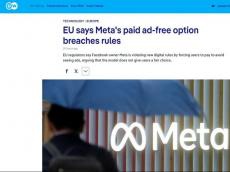|
|
TODAY.AZ / World news
European Commission believes that Meta violates law on digital markets
02 July 2024 [18:58] - TODAY.AZ

By Alimat Aliyeva
The European Commission accuses the American corporation Meta of violating the Digital Markets Act (DMA) due to a new subscription model that provides for a fee for using social networks Facebook and Instagram without advertising, Azernews reports.
In a statement issued by the European Commission on Monday, July 1, it says that this model does not allow users to "freely agree" to transfer their data for personalized advertising.
Facebook Instantiation Meta provides that from November 1, 2023, users in the EU can choose whether to continue using Facebook and Instagram for free with ads or to purchase a subscription to use these platforms without ads. Instagram Facebook account subscription applies to all linked Facebook and Instagram accounts and costs 9.99 euros per month when paying via the website and 12.99 euros per month when purchasing via the iOS and Android app.
"This choice of two options forces users to agree to combine all their personal data and does not allow them to receive a less personalized, but equivalent version of Meta social networks," the European Commission said in a statement.
However, Meta claims that the proposed model meets the requirements of the DMA.
"We are committed to continuing a constructive dialogue with the European Commission to resolve this issue," a company spokesman said.
It should be recalled that the law on digital markets, in force in the EU countries since March this year, is aimed at preventing large technology companies from abusing their dominant position and enabling new players to enter the market. Currently, the regulatory act applies to 22 services of six large technology companies that control market access for other players. Among them are five American companies: Alphabet (the parent company of Google), Amazon, Apple, Meta and Microsoft, as well as the Chinese ByteDance.
In addition, along with the DMA, the Digital Services Act (DSA) is already in force in the European Union, obliging Internet platforms and social networks to take measures to protect users from illegal content, goods and services.
URL: http://www.today.az/news/regions/250184.html
 Print version
Print version
Connect with us. Get latest news and updates.
See Also
- 19 December 2024 [09:00]
South Korean military to conduct anti-UAV exercises - 19 December 2024 [08:00]
Honda and Nissan plunge in initial merger talks - 18 December 2024 [23:19]
Seoul sanctions entities aiding Russia-North Korea cooperation - 18 December 2024 [21:23]
Shortlist of Oscar nominees in ten categories announce - 18 December 2024 [20:22]
Global demand for coal reaches record high this year - 18 December 2024 [19:22]
Unusual spiral galaxy of early Universe discovers - 18 December 2024 [09:00]
Montenegro tops among largest number of registrations in national domains - 18 December 2024 [08:00]
China extends visa-free transit for citizens of 54 countries - 17 December 2024 [22:46]
Million years ago bannes: Adele accuses of plagiarizing Brazilian song - 17 December 2024 [21:48]
Argentina manages to get out of economic downturn this year
Most Popular
 UNESCO celebrates 950th anniversary of Diwan Lughat al-Turk
UNESCO celebrates 950th anniversary of Diwan Lughat al-Turk
 Azerbaijan's FM meets with Secretary of Holy See for Relations with States and International Organizations
Azerbaijan's FM meets with Secretary of Holy See for Relations with States and International Organizations
 Azerbaijani Foreign Ministry congratulates Kingdom of Bahrain on national holiday
Azerbaijani Foreign Ministry congratulates Kingdom of Bahrain on national holiday
 Azerbaijan's Ministry of Emergency Situations marks 19th Anniversary
Azerbaijan's Ministry of Emergency Situations marks 19th Anniversary
 First VP Mehriban Aliyeva shares footage of President Recep Tayyip Erdogan singing Sari Gelin
First VP Mehriban Aliyeva shares footage of President Recep Tayyip Erdogan singing Sari Gelin
 More Armenians fly: the crisis of power in Canada
More Armenians fly: the crisis of power in Canada
 Azerbaijani delegation participates in internet governance forum in Riyadh
Azerbaijani delegation participates in internet governance forum in Riyadh
